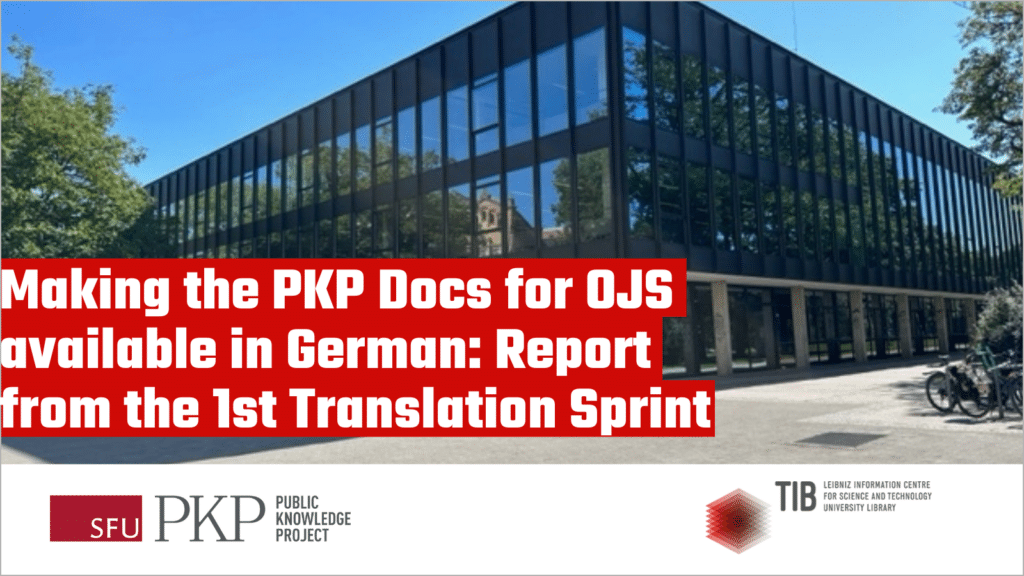
TIB, a long-standing supporter and development partner of the Public Knowledge Project, hosted the first translation sprint, more than 10,000 words were translated
See the original German version in TIB’s blog
The free and open source software Open Journal Systems (OJS) by the Public Knowledge Project (PKP) is a very popular workflow management software in European Open Access (OA) publishing (cf. e.g. country reports in Armengou et al., 2023) and more than 80 institutions offer OJS hosting in the German speaking countries (IPOA-Redaktionsteam, 2021). However, to date, there is no translation of the user documentation (PKP Docs) for the OJS software into German (Learning OJS 3, n.d..). To address this issue, TIB’s Diamond OA publisher TIB Open Publishing, invited to the first translation sprint: Modelled on the PKP developer sprints, we worked in groups on self-selected parts of the documentation for 1.5 days.
The participants were from several institutions in the German speaking area, including the University Library Cologne, the State and University Library Göttingen, the Ruhr University Bochum, the Free University Berlin, the North Rhine-Westphalian Library Service Centre (bzw-nrw), PsychOpen GOLD (Leibniz Institute of Psychology), the University Library Münster, the University of Münster and the University of Innsbruck. The group is happy to welcome new people and institutions at any point in time.
How does a translation sprint work?
As part of the virtual sprint, we first introduced the translation software (Crowdin) and additional resources for the translation process. These included a Cryptpad for organizational information, a glossary of terms manually collected in the German OJS software translation interface, and a link to the Weblate instance used for the OJS and Open Monograph Press (OMP) software translations. The pad and glossary remained open for additions, exchanges, notes, and changes throughout the sprint.
Next, the participants were asked to select and prioritize parts of the documentation for translation based on their personal use cases. The first sections from the OJS 3.3 documentation chosen by the participants included “About OJS”, “Editorial Workflow”, “Users and Roles,” and “User Accounts”. Subsequently, four smaller groups retreated to break-out rooms to work collaboratively on the different sections. Translation techniques varied from group to group between working individually after splitting the sections up further and translating string by string as a group. All groups set breaks and periods without video or audio connection at their own terms.
The progress of each group was collected in the shared pad to keep the other groups asynchronously updated. While the first day was dedicated to translations, the second day was split between translating and proofreading: The finished translations were exchanged between the groups, reciprocally proofread and changed if needed. Additionally, the entire group came together at regular intervals to discuss uncertainties, like the translation of certain terms. In turn, these consensus decisions were recorded in the shared pad for future sprints. As a result of the first translation sprint, we managed to collectively translate more than 10,000 words that were ready for the final proofreading stage in the translation software. After the sprint, this last step was handled by colleagues from TIB Open Publishing before passing it on for approval by PKP’s Documentation & Multilingualism Specialist.
How to participate in a translation sprint for the OJS documentation?
A second sprint took place on 4th February 2025, with a third date set for 9th April 2025 and a fourth for 18th June 2025. The concept developed from the first sprint to limiting the time effort to one day. The format remains a virtual one with breakout rooms. Additionally, some groups will work on proofreading from the start instead of translations, as some members have continued translating in between sprint sessions. Everyone who is interested in joining the sprint in April 2025 is welcome to reach out to TIB Open Publishing and will receive more information.
TIB as a PKP partner
TIB is a long-standing supporter and development partner of the Public Knowledge Project. In this role, TIB is contributing to PKP operations and software development. We provide feedback on PKP activities, and we collaborate on joint activities. We provide information and support to the German OJS community. This commitment is part of our support for open access, especially for Diamond Open Access and a diverse publishing landscape that can rely on free software like Open Journal Systems. By working on the documentation, we support German-speaking editors and administrators of OJS journals. We are always willing to analyse additional needs and wishes from the German OJS landscape.
Contributing to PKP Documentation
As a free and open-source (FOSS) community, the Public Knowledge Project relies on strong support from a global community of contributors to strengthen and grow its ongoing maintenance and development. One contribution pathway is the translation of software and documentation.
PKP Documentation is coordinated, created, and maintained by the Documentation Interest Group (DIG) and community members. The DIG also welcomes the creation of regional and/or language groups like the Spanish DIG.
Thanks to the efforts of our community members, PKP software has been translated into more than 45 languages, and different guides are available in five languages. Other groups are also welcome to create translation groups and host translation sprints.
If you are interested in contributing or hosting a translation sprint, see PKP’s Guidelines for Contributing to PKP Documentation or contact us at documentation@publicknowledgeproject.org.
Armengou, C., Aschehoug, A., Ball, J., Bargheer, M., Bosman, J., Brun, V., de Pablo Llorente, V., Franczak, M., Frantsvåg, J. E., Hersperger, O., Klaus, T., Kramer, B., Kuchma, I., Laakso, M., Manista, F., Melinščak Zlodi, I., Mounier, P., Pölönen, J., Pontille, D., … Wnuk, M. (2023). Institutional Publishing in the ERA: Results from the DIAMAS survey. https://doi.org/10.5281/ZENODO.10022184
IPOA-Redaktionsteam. (2021). OJS-de.net – Das Netzwerk für OJS-Dienstleister. OJS-de.Net. https://ojs-de.net/netzwerk
Learning OJS 3: A Visual Guide to Open Journal Systems. (n.d.). PKP Docs. Retrieved February 17, 2025, from https://docs.pkp.sfu.ca/learning-ojs/en/
